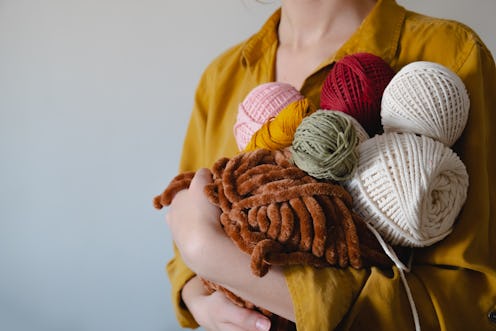Self
What If Your Coping Strategies Hit The Pandemic Wall, Too?
It’s all about sustainable self-care.

Six months ago, baking a loaf of sourdough on a Saturday afternoon was a sure bet to lift some of the pandemic doldrums. Now, a year into the pandemic and its attendant lockdowns, the idea of just feeding the starter causes more stress than you had in the first place. Since we're going to still be in the pandemic for the foreseeable future, it helps to understand why your early-COVID coping mechanisms aren't working any more, and how you can find new ones.
"We are contending with ambiguous losses on many levels," Liz Kelly LICSW, a therapist with therapy platform Talkspace, tells Bustle. "The loss of our routines, sense of safety, social connections, livelihoods, and hopes for the future lead to feelings of grief, and grieving does not follow a specific pattern or timeline."
Kelly says that it's natural for your emotions to shift during the pandemic, and that your coping skills will need to adapt as well. An analysis of 63 studies published in PLOS One in December 2020 found that one in three adults are now experiencing anxiety and depression. Researchers have identified post-pandemic post-traumatic stress disorder, or PTSD, as a significant health concern, according to a 2021 study in Molecular Psychiatry.
How To Tell If Your Coping Strategies Aren't Working
The major signal that your daily yoga habit might need to change is your emotional health, Kelly says. "We might feel relatively OK one day, but the next day feel completely overwhelmed and unable to cope," she says. A wide range of emotions could surface, from frustration to irritability, sadness, or boredom.
The stuff that you might once have enjoyed may now seem like an obligation, or bring out negative feelings. "Things that may have worked well in the beginning of COVID-19, like weekly Zoom calls with friends or cooking complicated recipes, might feel burdensome as pandemic fatigue and burnout has set in," Kelly says.
You may also not be feeling very much at all. "The constant pressures of the pandemic have overtaxed our stress response and apathy has set in for many," Kelly says. This is the pandemic wall — the point of total emotional and physical exhaustion with, well, everything, after a year of trying to hold things together. And it signals that your coping strategies need a revamp.
What To Do When You Need New Ways To Cope With COVID Anxiety
"Sometimes we need to reevaluate and adjust our coping mechanisms if they are no longer effective," Neda Gould Ph.D., an assistant professor at the Department of Psychiatry and Behavioral Sciences at the Johns Hopkins School of Medicine, tells Bustle. Rather than going back to your old behaviors repeatedly, she recommends a reset.
First, acknowledge how you're feeling, rather than pushing it down. "Give yourself permission to name and feel your emotions without judgement," Kelly says. That might provide a first step to finding new activities and ideas. Psychotherapist Dr. Lisa A. Henshaw suggests letting go of any expectations or frustrations you've been carrying towards yourself. "This is something that nobody has the perfect plan for," she says.If you're frustrated that something isn't working any more, that could end up being more emotionally draining overall, so it's important to acknowledge your loss, she says.
"It can be useful to think about the goal we are trying to accomplish (e.g., decrease stress, improve mood) and identify small steps that we can achieve toward that goal each week," Gould says. Trying something new, like mindfulness, might stimulate the brain's need for novelty, which is desperately needed in these times of deep same-ness.
"We may need to be creative about our coping strategies," Gould says. Identify the parts of pastimes you love. Maybe you got really into crocheting but now can't stand shawls; now could be a good time to investigate embroidery or something else involving your hands. Try not to get pulled into the things that are popular with friends or on social media, Henshaw says. "Everyone is different; do not push yourself to adopt something that does not make you feel good."
How To Practice Pandemic Self-Care Sustainably
Focusing on day-to-day actions rather than long-term goals may also help, Henshaw says. "If we can work to bring our thoughts, awareness and actions back to the present moment, then we can identify ways to empower ourselves," she says. Plan things out daily, giving yourself some solid ground. "Choose intentions and tasks for your day that are attainable, and that help you feel a sense of accomplishment," Henshaw advises — like cleaning your bathroom, or making lunch instead of heating up leftovers. Little wins are a big deal right now.
And try not to blame yourself. "Recognize that your difficulty coping with the pandemic is not your fault," Kelly says. "Having a hard time right now is not because you aren’t trying hard enough." She and Gould recommend reaching out to a professional if you don't feel like you can identify new ways to cope, or are having a hard time managing your everyday life. "It’s OK to ask for help during these challenging times," Gould says.
Experts:
Dr. Lisa A. Henshaw Ph.D. LSCW
Neda Gould Ph.D
Liz Kelly LICSW
Studies cited:
Sadiković, S., Branovački, B., Oljača, M., Mitrović, D., Pajić, D., & Smederevac, S. (2020). Daily Monitoring of Emotional Responses to the Coronavirus Pandemic in Serbia: A Citizen Science Approach. Frontiers in psychology, 11, 2133. https://doi.org/10.3389/fpsyg.2020.02133
Wang, Y., Kala, M. P., & Jafar, T. H. (2020). Factors associated with psychological distress during the coronavirus disease 2019 (COVID-19) pandemic on the predominantly general population: A systematic review and meta-analysis. PloS one, 15(12), e0244630. https://doi.org/10.1371/journal.pone.0244630
Yuan, K., Gong, YM., Liu, L. et al. (2021) Prevalence of posttraumatic stress disorder after infectious disease pandemics in the twenty-first century, including COVID-19: a meta-analysis and systematic review. Mol Psychiatry. https://doi.org/10.1038/s41380-021-01036-x